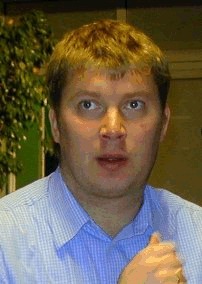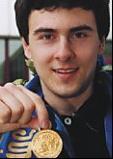23.03.2005
Shirov & Macieja talks about Kasparov's retirement
Alexei Shirov's opinion

Where would you place Kasparov among the other world champions?
I think Kasparov has made the most significant contribution to chess. Between 1982 and 2002 he was indisputably the best player in the world (occasional failures did not spoil the overall picture), and after that he also produced two excellent results shortly before the retirement. Fischer's vertical raise between 1967 and 1972 was arguably more brilliant than any given 5-year period in Kasparov's career, but being on top for 20 years straight is a completely different matter.
Outside the chess board Kasparov will be remembered for his attempts to acquire the power over the chess world and for his 'political games', in which he constantly changed the 'skin color', like a true chameleon. He supported bombings of Serbia, a military action in Iraq, a plunder of Russia in the 90s, and I'm afraid the worst is still to come as the chess playing is now over.
Naturally, it is unpleasant for me to recall the story of our aborted match in 1998. In my opinion, Kasparov started to act dishonorably as the first problems with sponsors arrived. However, I do not want to go into details any more.
How will his retirement affect the chess society?
I do not expect significant changes. Hopefully chess will continue to develop further. Also, one can already sense a tendency towards democratization, which is very important. Unfortunately, the game is almost 'eaten up' by computers, but those who move the pieces are nevertheless humans...
Should the FIDE proposal concerning the championship match-tournament remain in effect, or it makes sense to reconsider or even call it back?
I think this is an ideal situation to join the efforts of the ACP, FIDE and independent organizations in order to conduct the world championship. I also believe that the candidates list should be expanded, as FIDE's "Top Eight" will not coincide with such of the ACP, plus certain historical considerations should also be taken into the account.
Bartolomiej Macieja's opinion

Where would you place Kasparov among the other world champions?
Kasparov is one of the strongest players of all times. Fischer, Karpov and Kasparov form the 'Holy Trinity' for me. Kasparov excelled in active and sharp play (even with Black!) and his opening preparation, especially since 90s, has been outstanding and unrivalled. Although the list of candidates for the world's best player title has expanded in the recent years, none of them came close to Kasparov's public recognition. Defeating Kasparov even in a single game was a dream of many chessplayers, but only few of them succeeded.
How will his retirement affect the chess society?
His retirement will change a lot of things. Most importantly, Kasparov is a symbol of chess. Even people who can't play chess, know Kasparov's name. Kasparov and chess is like Michael Jordan and basketball. The NBA experienced noticeable difficulties after Jordan's retirement, and only recently managed to overcome them. Hope that Kasparov's decision will not weaken the image of chess worldwide, but I have to admit that all of us, especially our FIDE bosses, score one goal after another – and, unfortunately, these are own goals.
Should the FIDE proposal concerning the championship match-tournament remain in effect, or it makes sense to reconsider or even call it back?
The issue is not whether it should be the tournament of 8 or 128. The main problem is that the FIDE leaders take important decisions without discussing them with anybody, and their decisions go from bad to worse. For instance, let's take the time control issue. Before the year 2000 everybody played classical chess. There was enough time to invent new opening ideas, find a good middlegame plan and convert the advantage in the endgame. And what happened after reducing the time limit? The number of mistakes increased dramatically, and endgame errors look simply disgusting. It is difficult to expect ingenious moves, giving a player just 30 seconds for each. Therefore chess with new FIDE control has become a probability game: "This move looks good, and that move is probably even better".
Another issue is who originated an idea of taking doping probes in chess, just the same doping probes as in heavy athletics? In chess there is a doping of different kind – computers. One should concentrate on measures aimed against receiving computer aid during the game. And what have we got? During the chess olympiad FIDE disqualified two 'chessplayers'. I put it into brackets because although they are nice people, calling them chessplayers has the same relevance as calling me a table tennis player. One of them is Bermudan, another is Papuan. Doping control is rather expensive a procedure. The expenses are covered by FIDE, which gathers money from national federations that receive membership fees from us chessplayers. When I found out that FIDE decided to take doping probes from a Papuan at my own expense, I immediately became concerned about the way they regulate chess life and they way we've got to such an idiotic situation. Such problems just keep arriving, and most of them appear due to incomprehensible decisions taken by the FIDE officials.
The same applies to the match-tournament. It's been a long since FIDE enjoyed some respect from chessplayers, and it does not surprise me. In recent years they have only issued press-releases about various matches and tournaments. Now they came up with the match-tournament announcement. And my question is: did they discuss it with the players? I doubt they discussed it with Kasparov – they didn't even know that he was planning to retire. Maybe, with Kramnik? Oh, yes. I can easily imagine Kramnik joyfully accepting their invitation: he has just qualified for the unification match with at least $ 1,000,000 guaranteed, and now he has to console with a half of that amount shared with another seven players. Other players? Well, did FIDE ever ask any other players? I am not saying that the match-tournament idea is bad, it just does not make sense to evaluate it. The problem is how could FIDE make such an announcement without discussing it with potential participants?
We already know what will follow. Soon we'll see the announcement that they already received bids from Vietnam, Belarus and Iraq, then only 'promising negotiations' with Congo will remain, and in two more years we will all be preparing for Swiss world championship tournament in Papua New Guinea, and I will receive a similar question: "Mr Macieja, is Swiss a good system for the world championship?" Sorry, I almost forgot – we will not meet even in New Guinea, because all the best players will be disqualified in order to assure the 'purity of king's game'.
Photo from ChessBase Archive
Questions were asked and translated by Misha Savinov.
This article is published with permission of Association of Chess Professionals
